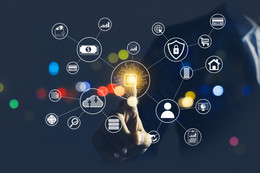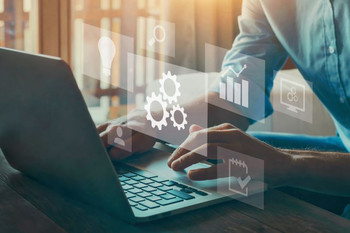17:48 Custom LMS Development Trends for 2025: Revolutionizing Digital Learning | |||
1. Artificial Intelligence and Machine Learning IntegrationThe integration of Artificial Intelligence (AI) and Machine Learning (ML) in custom LMS development will reach new heights by 2025, transforming the way learners interact with educational content and how administrators manage learning processes. Hyper-Personalized Learning Experiences: AI-powered LMS platforms will offer unprecedented levels of personalization. By analyzing vast amounts of data on learner behavior, preferences, and performance, these systems will create truly individualized learning paths. Content, pacing, and assessment methods will be dynamically adjusted in real-time to optimize each learner's experience and outcomes. Intelligent Content Creation and Curation: Machine learning algorithms will assist in creating and curating educational content. These systems will be able to analyze existing materials, identify knowledge gaps, and even generate new content to fill those gaps. This will significantly reduce the workload on content creators while ensuring that learning materials remain up-to-date and relevant. Predictive Analytics for Learner Success: Advanced predictive models will be able to forecast learner performance with high accuracy. These models will consider a wide range of factors, including past performance, engagement levels, and even external factors like work schedules or life events. This will allow for proactive interventions to support struggling learners before they fall behind. Natural Language Processing for Enhanced Interaction: Custom LMS platforms will incorporate sophisticated natural language processing capabilities, enabling more natural and intuitive interactions between learners and the system. This could include voice-activated commands, chatbots that can answer complex queries, and automatic translation features for multilingual support. 2. Immersive Learning TechnologiesThe integration of immersive technologies into custom LMS platforms will create more engaging and effective learning experiences in 2025. Virtual Reality (VR) Learning Environments: Custom LMS solutions will offer seamless integration with VR technologies, allowing for the creation of fully immersive learning environments. These could range from historical reconstructions for history lessons to complex simulations for scientific experiments or technical training. Augmented Reality (AR) for Blended Learning: AR features will become a standard component of custom LMS platforms, enhancing real-world learning experiences with digital overlays. This could include interactive textbooks, AR-enhanced field trips, or on-the-job training applications that provide real-time information and guidance. Mixed Reality Collaborative Spaces: Advanced LMS platforms will support mixed reality environments where physical and digital objects coexist. This will enable new forms of collaborative learning, allowing remote learners to interact with each other and with digital content as if they were in the same physical space. Haptic Feedback for Skill Development: The integration of haptic feedback technologies will add a new dimension to immersive learning experiences. This will be particularly valuable for developing motor skills in fields such as medicine, manufacturing, and the arts, allowing learners to feel virtual objects and receive tactile feedback on their actions. 3. Blockchain for Credentialing and Skill VerificationBlockchain technology will play a significant role in custom LMS development by 2025, revolutionizing the way educational achievements are recorded, verified, and shared. Secure and Verifiable Digital Credentials: Blockchain-based digital credentials will become the standard for certifying educational achievements. These tamper-proof records will provide instant verification of degrees, certifications, and course completions, streamlining the hiring process and reducing fraud. Micro-Credentialing and Skill Tokens: Custom LMS platforms will support the issuance of micro-credentials and skill tokens on the blockchain. These granular representations of skills and knowledge will allow learners to showcase specific competencies acquired through various learning experiences, providing a more detailed and flexible representation of their capabilities. Lifelong Learning Passports: Blockchain technology will enable the creation of comprehensive, secure digital learning passports. These will serve as a permanent record of an individual's educational journey, including formal qualifications, informal learning experiences, and acquired skills. Learners will have full control over their data and can choose what information to share with employers or educational institutions. Smart Contracts for Automated Certifications: Advanced LMS platforms will utilize smart contracts on blockchain networks to automate the issuance of certifications. When predefined learning objectives or assessment criteria are met, the smart contract will automatically issue and record the appropriate credential on the blockchain. 4. Adaptive Learning and Dynamic Content DeliveryAdaptive learning technologies will become more sophisticated in 2025, allowing custom LMS platforms to deliver truly personalized learning experiences. Real-Time Content Adaptation: LMS platforms will use AI to analyze learner interactions in real-time, dynamically adjusting content difficulty, presentation style, and pacing to match the individual's learning style and progress. This ensures that each learner is consistently challenged without becoming overwhelmed or bored. Multimodal Content Delivery: Adaptive systems will automatically switch between different content formats (text, video, audio, interactive elements) based on a learner's preferences and performance, ensuring optimal engagement and comprehension. Emotional Intelligence in Adaptive Learning: Advanced LMS platforms will incorporate emotional intelligence capabilities, using facial recognition, voice analysis, and other biometric data to gauge a learner's emotional state. This information will be used to adjust the learning experience, providing encouragement or breaks when needed. Adaptive Assessments: Assessment tools within LMS platforms will become more dynamic, adjusting question difficulty and format based on the learner's responses. This provides a more accurate measure of knowledge and skills while reducing test anxiety and improving the overall assessment experience. 5. Microlearning and Just-in-Time LearningThe trend towards bite-sized, on-demand learning content will continue to gain momentum in 2025, catering to the needs of busy professionals and the modern attention span. AI-Curated Microlearning Pathways: Custom LMS platforms will use AI to create personalized microlearning pathways, assembling bite-sized content modules into coherent learning journeys tailored to each user's goals and preferences. Context-Aware Microlearning: Advanced LMS solutions will offer context-aware, just-in-time learning resources that can be accessed at the moment of need. Using data from IoT devices and user behavior patterns, these systems will proactively suggest relevant microlearning content based on the learner's current task or environment. Gamified Microlearning Experiences: To enhance engagement with bite-sized content, custom LMS platforms will incorporate more sophisticated gamification elements. This could include narrative-driven learning adventures, augmented reality challenges, or competitive elements that encourage regular engagement with microlearning content. Social Microlearning: LMS developers will create features that facilitate the sharing and discussion of microlearning content among peers. This could include social media-style feeds of learning snippets, collaborative microlearning challenges, or peer-to-peer microteaching opportunities. 6. Advanced Data Analytics and Learning InsightsAs data becomes increasingly valuable in education, custom LMS development in 2025 will focus on providing more comprehensive and actionable analytics. Real-Time Learning Analytics Dashboards: LMS platforms will offer sophisticated analytics dashboards that provide real-time insights into learner engagement, progress, and performance. These dashboards will use advanced data visualization techniques to make complex information easily digestible for educators and administrators. Predictive Modeling for Educational Outcomes: By leveraging big data and machine learning, custom LMS solutions will offer predictive modeling capabilities to forecast learner outcomes and identify potential areas for intervention. This will enable proactive support and personalized guidance to improve student success rates. Natural Language Processing for Feedback Analysis: Advanced LMS platforms will use natural language processing to analyze open-ended learner feedback, discussion posts, and assignments. This analysis will provide insights into learner sentiment, comprehension levels, and areas of difficulty across courses and content. Learning Experience Analytics: Custom LMS developers will incorporate tools to analyze the effectiveness of various learning experiences and content types. This data will help instructors and instructional designers optimize course materials and teaching strategies for maximum impact. 7. Social Learning and Collaborative EcosystemsRecognizing the importance of social interaction in the learning process, custom LMS development in 2025 will focus on creating robust social and collaborative features. Virtual Learning Communities: LMS platforms will evolve to include sophisticated virtual learning communities that foster peer-to-peer interaction and knowledge sharing. These communities will support various forms of collaboration, from informal discussions to structured group projects. AI-Facilitated Peer Matching: Custom LMS solutions will use AI algorithms to match learners for study groups, peer mentoring, or collaborative projects based on complementary skills, learning goals, and schedules. This intelligent matching will enhance collaborative learning experiences and improve outcomes. Virtual Co-Working Spaces: Advanced collaboration tools will enable learners to work together in virtual co-working spaces, regardless of their physical location. These spaces will support real-time document sharing, collaborative editing, and seamless communication among team members. Social Learning Analytics: LMS platforms will provide insights into social learning dynamics, tracking patterns of collaboration, knowledge sharing, and peer support. This data will help administrators and instructors foster more effective collaborative learning environments. 8. Integration of Internet of Things (IoT) DevicesThe Internet of Things will play an increasing role in custom LMS development, expanding the boundaries of the learning environment and providing new data sources for personalized learning. Wearable Device Integration: LMS platforms will integrate with wearable devices to track physical activities, stress levels, and other biometric data. This information can be used to optimize learning schedules, recommend breaks, or incorporate wellness activities into the learning experience. Smart Classroom Ecosystems: Custom LMS solutions will offer seamless integration with smart classroom technologies, such as interactive displays, environmental sensors, and attendance tracking systems. This integration will enhance the blended learning experience and provide valuable data on in-person learning activities. IoT-Enabled Practical Training: In fields like manufacturing, healthcare, or engineering, LMS platforms will interface with IoT-enabled equipment to provide real-time data and feedback during practical training sessions. This will allow for more realistic and data-driven hands-on learning experiences. Location-Based Learning Triggers: Geolocation features will enable LMS platforms to deliver context-aware content based on a learner's physical location. This can be used to support field-based learning activities, provide just-in-time information during site visits, or offer location-specific safety training. 9. Accessibility and Universal DesignCustom LMS development in 2025 will place a strong emphasis on accessibility and universal design principles to ensure that e-learning platforms are inclusive and usable by all learners. AI-Powered Accessibility Features: Advanced natural language processing and computer vision technologies will enable LMS platforms to automatically generate alternative text for images, provide real-time closed captioning for videos, and offer audio descriptions of visual content. Adaptive User Interfaces: Custom LMS solutions will offer highly adaptable user interfaces that can be customized to accommodate various visual, auditory, and motor needs. This may include adjustable color schemes, font sizes, and navigation options to ensure a comfortable learning experience for all users. Multimodal Content Delivery LMS platforms will support multimodal content delivery, allowing learners to choose their preferred format (text, audio, video, interactive) for accessing educational materials. AI algorithms will help suggest the most effective content format based on individual learning preferences and accessibility needs. Cognitive Accessibility Tools: Advanced LMS platforms will incorporate features designed to support learners with cognitive disabilities, such as adjustable content complexity levels, distraction-free reading modes, and tools for organizing and prioritizing tasks. 10. Continuous Learning and Skill Gap AnalysisAs the concept of lifelong learning becomes increasingly important, custom LMS platforms in 2025 will focus on supporting continuous learning and helping users identify and address skill gaps. AI-Driven Career Pathing: LMS platforms will use AI to analyze a learner's current skills, interests, and career goals to suggest personalized learning pathways. These pathways will be dynamically updated based on the learner's progress and changes in industry demands. Integration with Labor Market Data: Custom LMS solutions will integrate with real-time labor market databases to provide insights into in-demand skills and emerging job opportunities. This integration will help learners align their educational pursuits with current market needs. Automated Skill Gap Analysis: Advanced LMS platforms will incorporate automated skill gap analysis tools that compare a learner's current skillset with job market demands or organizational requirements. These tools will provide actionable recommendations for closing identified skill gaps. Continuous Learning Recommendation Engine: AI-driven systems will provide ongoing recommendations for courses, webinars, and other learning resources based on a user's career progression, industry trends, and personal interests. This will encourage lifelong learning and help professionals stay current in their fields. Conclusion: As we look towards 2025, the landscape of custom LMS development is set to undergo significant transformations. The integration of AI, immersive technologies, and blockchain will create more personalized, engaging, and verifiable learning experiences. The focus on microlearning, social collaboration, and continuous skill development will cater to the evolving needs of modern learners, while enhanced analytics and IoT integration will provide deeper insights and expand the boundaries of the learning environment. Companies like Aristek are at the forefront of these developments, leveraging cutting-edge technologies to create custom LMS solutions that meet the diverse needs of learners and organizations. As the e-learning industry continues to evolve, Aristek and other innovative developers will play a crucial role in shaping the future of digital education. The trends discussed in this article represent just a glimpse of the exciting possibilities that lie ahead in the world of custom LMS development. As technology continues to advance and our understanding of effective learning methodologies deepens, we can expect to see even more innovative features and capabilities emerge in the coming years. As we navigate this evolving landscape, it's clear that the future of education and training will be more personalized, accessible, and effective than ever before. Custom LMS development will be at the heart of this transformation, empowering learners to achieve their goals and organizations to cultivate a skilled and adaptable workforce. The journey towards this future of learning is already underway, and the innovations we see in 2025 will set the stage for even greater advancements in the years to come.
За матеріалами Голос UA на РФ
Також читайте:
| |||
| Категорія: Новини культури та освіти | Переглядів: 383 | Додав: admin | Теги: | |||
| Всього коментарів: 0 | |










